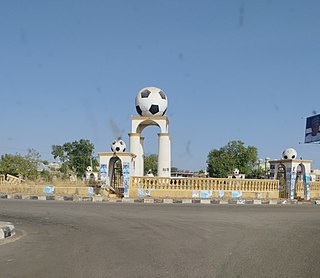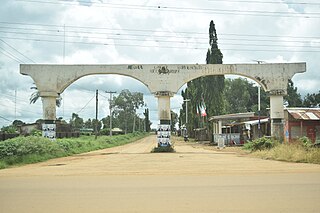Shehu Usman ɗan Fodio a Student of Jibril Ibn Umar was a Fulani scholar, Islamic religious teacher, revolutionary and a philosopher who founded the Sokoto Caliphate and ruled as its first caliph. After the successful revolution, the "Jama'a" gave him the title Amir al-Mu'minin. He rejected the throne and continued calling to Islam.

Sokoto is a major city located in extreme north-western Nigeria, near the confluence of the Sokoto River and the Rima River. As of 2006, it has a population of over 427,760. Sokoto is the modern-day capital of Sokoto State and was previously the capital of the north-western states. Modern Sokoto is known for trading sheepskins, cattle hides, leather crafts, kola nuts and goatskins.

The Sokoto Caliphate, also known as the Sultanate of Sokoto, was a Sunni Muslim caliphate in West Africa. It was founded by Usman dan Fodio in 1804 during the Fulani jihads after defeating the Hausa Kingdoms in the Fulani War. The boundaries of the caliphate are part of present-day Cameroon, Burkina Faso, Niger, and Nigeria. By 1837, the Sokoto state had a population of around 10-20 plus million people, becoming the most populous empire in West Africa. It was dissolved when the British, French and Germans conquered the area in 1903 and annexed it into the newly established Northern Nigeria Protectorate, Senegambia and Niger and Kamerun respectively.

Kano State is one of the 36 states of Nigeria, located in the northern region of the country. According to the national census done in 2006, Kano State is the most populous state in Nigeria. The recent official estimates taken in 2016 by the National Bureau of Statistics found that Kano State was still the largest state by population in Nigeria. Created in 1967 out of the former Northern Region, Kano State borders on Katsina State to the northwest for about 210 km, Jigawa State to the northeast for 355 km, Bauchi State to the southeast for 131 km, and Kaduna State to the southwest for 255 km. The state's capital and largest city is the city of Kano, the second most populous city in Nigeria after Lagos. The incumbent governor of the state is Abba Kabir Yusuf. He was sworn in on 29 May 2023.

Kaduna State is a state in the northwest geopolitical zone of Nigeria. The state capital is its namesake, the city of Kaduna which happened to be the 8th largest city in the country as at 2006. Created in 1967 as North-Central State, which also encompassed the modern Katsina State, Kaduna State achieved its current borders in 1987. Kaduna State is the fourth largest and third most populous state in the country, Kaduna State is nicknamed the Centre of Learning, owing to the presence of numerous educational institutions of importance within the state such as Ahmadu Bello University.

Katsina State is a state in the northwestern geopolitical zone of Nigeria. Katsina State borders on the Republic of Niger to the north for 250 km and the States of Jigawa for 164 km and Kano to the east, Kaduna to the south for 161 km and Zamfara to the west. States. Nicknamed the "Home of Hospitality", both the state capital and the town of Daura have been described "ancient seats of Islamic culture and learning" in Nigeria.

Northern Nigeria was an autonomous division within Nigeria, distinctly different from the southern part of the country, with independent customs, foreign relations and security structures. In 1962, it acquired the territory of the British Northern Cameroons, which voted to become a province within Northern Nigeria.

Zaria is a metropolitan city in Nigeria which lies within four local government areas in Kaduna State; it is the capital city to the Zazzau Emirate Council, and one of the original seven Hausa city-states and a major city in the state. The local government areas that made up of the city of Zaria includes: Zaria Local Government, Sabon Gari Local Government, Giwa Local Government and Soba Local Government areas in Kaduna state, Nigeria.

Katagum is a town, a local government area and a traditional emirate in Bauchi State of north eastern Nigeria. The town is located on the northern bank of the Jama'are River, which is a tributary of the Hadejia. Most of the inhabitants are peoples from the Fulani, Kanuri, Karai-karai and Hausa tribes. The chief agricultural products include peanuts (groundnuts), sorghum, millet, rice, cowpeas, cotton, indigo, and gum arabic. Livestock include horses, cattle, goats, sheep, donkeys and a lot of poultry.

Gombe is the capital city of Gombe State, north-eastern Nigeria, with an estimated population of 573, 000. The major spoken languages in Gombe are Hausa and Fulfulɗe, Tera and Tangale.
Igabi is a Local Government Area (LGA) of Kaduna State, Nigeria. It is chaired by the Executive Chairman - Jabir Khamis, It is one of 774 local government areas in Nigeria. Rigasa ward is under Igabi LGA, one of the most populous wards in the country.
The Gbari or Gbagyi are an ethnic group found predominantly in Central Nigeria, with an estimated population figure put at 5.8 million, spread in four States, including the FCT, and located in thirty local Government areas, according to the 2006 National Population Census figures. It is also the name of their language. Members of the ethnic group speak two dialects. While speakers of the dialects were loosely called Gwari by both the Hausa Fulani and Europeans during pre-colonial Nigeria they prefer to be known as Gbagyi/Gbari. They live in the Niger, the Federal Capital Territory - Abuja, and Kaduna State. They are also found in Nasarawa central Nigeria Area. Gbagyi/Gbari is one of the most populated ethnic groups in the middle belt and indigenous in the Federal Capital Territory of Nigeria. This means Gbagyi people are the bonafide owners of the Nigerian capital city, Abuja.
Faskari is a town and Local Government Area (LGA) in Katsina State, northern Nigeria. The population of the LGA was 125,181 as of 2003. The current Sarki (Emir) is Eng. Aminu Tukur Saidu, and the Executive Chairman is Honourable Bala Faskari, an APC member.
Zungeru is a town in Niger State, Nigeria. It was the capital of the British protectorate of Northern Nigeria from 1902 until 1916. It is the site of the Niger State Polytechnic and is located on the Kaduna River.

Jema'a is a Local Government Area in southern Kaduna State, Nigeria with headquarters at Kafanchan. The Local Government Council is chaired by Yunana Barde. It has an area of 1,384 km2 and a population of 278,202 at the 2006 census. The postal code of the area is 801.
The Daura Emirate is a religious and traditional state in Northern Nigeria, the Emir of Daura still rules as a ceremonial hereditary monarch, and maintains a palace. Muhammad Bashar became the emir in 1966, reigning for 41 years until his death in 2007, On 28 February 2007, Umar Faruk Umar became Emir of Daura succeeding Muhammad Bashar.

The Kamuku National Park is a Nigerian national park in Kaduna State, Nigeria, with a total area of about 1,120 km2 (430 sq mi). The park has a typical Sudanian Savanna ecology.
Herder–farmer conflicts in Nigeria are a series of disputes over arable land resources across Nigeria between the mostly-Muslim Fulani herders and the mostly-Christian non-Fulani farmers. The conflicts have been especially prominent in the Middle Belt since the return of democracy in 1999. More recently, they have deteriorated into attacks on farmers by Fulani herdsmen.
Umaru Nagwamatse dan Abu Bakr Atiku was the founder and the first ruler of the Kontagora Emirate. He was the grandson of Usman dan Fodio and the son of the third sultan of the Sokoto Caliphate, Sultan Abu Bakr Atiku.
The genesis of the 1992 Zangon Kataf crises could at least be traced to the onset of the British imperial regime in the Northern Region of Nigeria, in which the Atyap people began reporting the loss of land to the Hausas. In 1922, it was reported that a large piece of land was acquired by the Emir of Zaria, Dalhatu Uthman Yero, who failed to compensate the indigenous population of the region. In 1966, the land was provided to the Hausa trading settlement in the heart of Mabatado, called "Zangon Kataf", by the emir, Muhammad Usman. The Atyap resided within the district, in the Zaria Province of the Northern Region of, initially, British Nigeria, which became independent Nigeria. It was to remain utilized as a marketplace, where the indigenous Atyap people were banned from trading pork and beer by the settlers.











